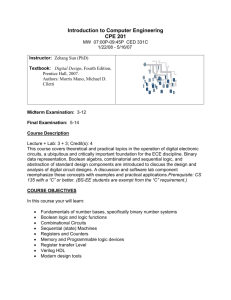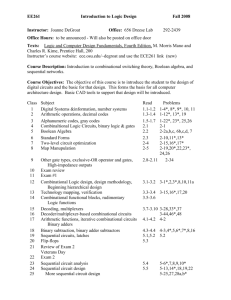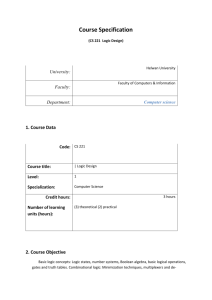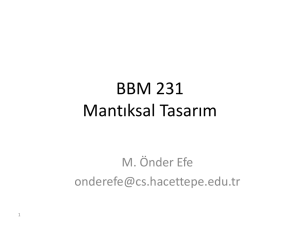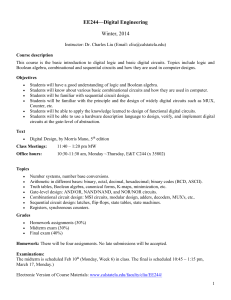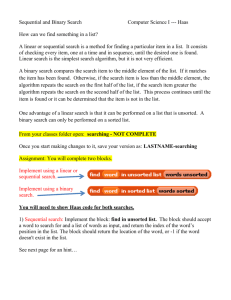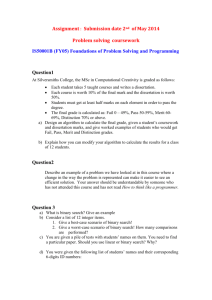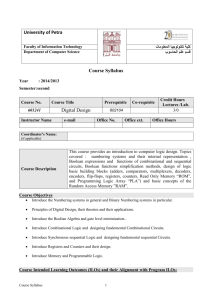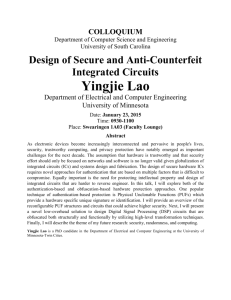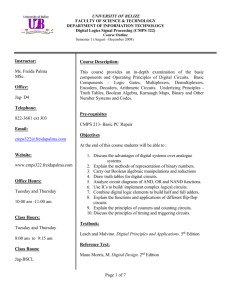digital logic fundamentals - Division of Engineering Programs
advertisement
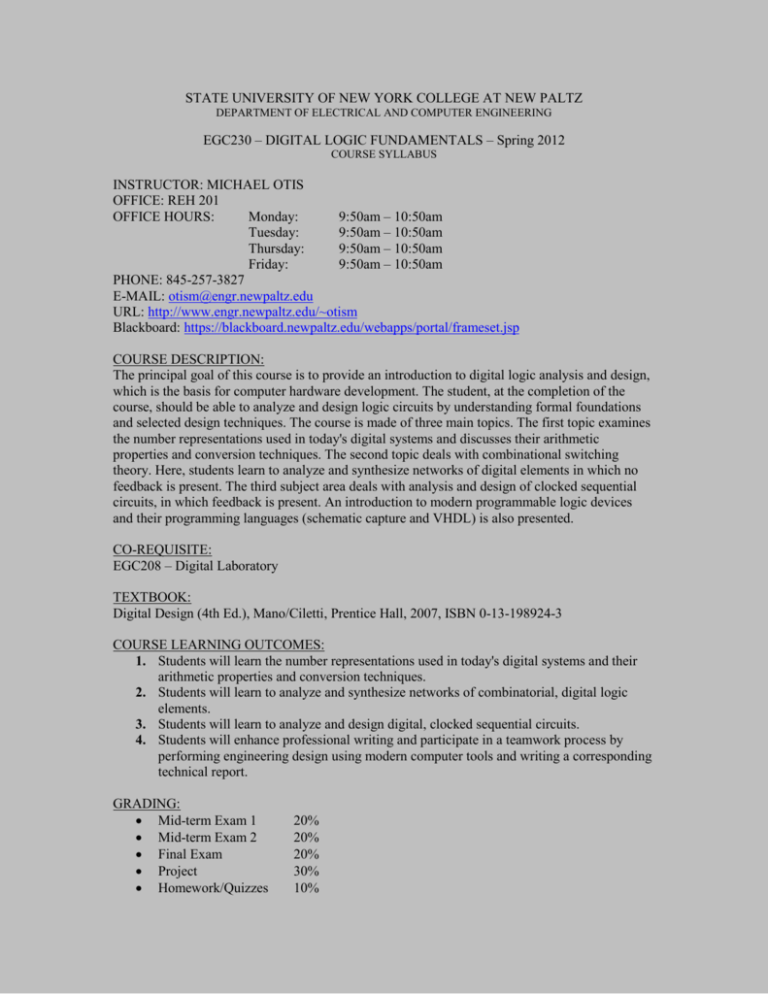
STATE UNIVERSITY OF NEW YORK COLLEGE AT NEW PALTZ DEPARTMENT OF ELECTRICAL AND COMPUTER ENGINEERING EGC230 – DIGITAL LOGIC FUNDAMENTALS – Spring 2012 COURSE SYLLABUS INSTRUCTOR: MICHAEL OTIS OFFICE: REH 201 OFFICE HOURS: Monday: 9:50am – 10:50am Tuesday: 9:50am – 10:50am Thursday: 9:50am – 10:50am Friday: 9:50am – 10:50am PHONE: 845-257-3827 E-MAIL: otism@engr.newpaltz.edu URL: http://www.engr.newpaltz.edu/~otism Blackboard: https://blackboard.newpaltz.edu/webapps/portal/frameset.jsp COURSE DESCRIPTION: The principal goal of this course is to provide an introduction to digital logic analysis and design, which is the basis for computer hardware development. The student, at the completion of the course, should be able to analyze and design logic circuits by understanding formal foundations and selected design techniques. The course is made of three main topics. The first topic examines the number representations used in today's digital systems and discusses their arithmetic properties and conversion techniques. The second topic deals with combinational switching theory. Here, students learn to analyze and synthesize networks of digital elements in which no feedback is present. The third subject area deals with analysis and design of clocked sequential circuits, in which feedback is present. An introduction to modern programmable logic devices and their programming languages (schematic capture and VHDL) is also presented. CO-REQUISITE: EGC208 – Digital Laboratory TEXTBOOK: Digital Design (4th Ed.), Mano/Ciletti, Prentice Hall, 2007, ISBN 0-13-198924-3 COURSE LEARNING OUTCOMES: 1. Students will learn the number representations used in today's digital systems and their arithmetic properties and conversion techniques. 2. Students will learn to analyze and synthesize networks of combinatorial, digital logic elements. 3. Students will learn to analyze and design digital, clocked sequential circuits. 4. Students will enhance professional writing and participate in a teamwork process by performing engineering design using modern computer tools and writing a corresponding technical report. GRADING: Mid-term Exam 1 Mid-term Exam 2 Final Exam Project Homework/Quizzes 20% 20% 20% 30% 10% COURSE OUTLINE: 1. Binary Systems. Digital Systems. Binary Numbers. Number Base Conversions. Octal and Hexadecimal Numbers. Complements. Signed Binary Numbers. Binary Codes. Binary Storage and Registers. Binary Logic. 2. Boolean Algebra and Logic Gates. Basic Definitions. Axiomatic Definition of Boolean Algebra. Basic Theorems and Properties of Boolean Algebra. Boolean Functions. Canonical and Standard Forms. Other Logic Operations. Digital Logic Gates. Integrated Circuits. 3. Gate-Level Minimization. The Map Method. Four-Variable Map. Five-Variable Map. Product of Sums Simplification. Don't-Care Conditions. NAND and NOR Implementation. Other Two-Level Implementations. Exclusive-OR Function. Hardware Description Language (HDL). 4. Combinational Logic. Combinational Circuits. Analysis Procedure. Design Procedure. Binary Adder/Subtractor. Decimal Adder. Binary Multiplier. Magnitude Comparator. Decoders. Encoders. Multiplexers. HDL for Combinational Circuits. 5. Synchronous Sequential Logic. Sequential Circuits. Latches. Flip-Flops. Analysis of Clocked Sequential Circuits. HDL for Sequential Circuits. State Reduction and Assignment. Design Procedure. 6. Registers and Counters. Registers. Shift Registers. Ripple Counters. Synchronous Counters. Other Counters. HDL for Registers and Counters. COURSE PROJECT: Using a hierarchical approach and XILINX ISE, design and verify (through simulation) a 4-bit Arithmetic-Logic-Unit (ALU) capable of Addition, Subtraction, AND, OR, XOR, and NOT. You also need to include status flags for the following arithmetic conditions: Zero, Carry, Negative, and Overflow. POLICIES: ADA Policy: If you have documented disabilities, inform the instructor privately during the first week of class and make proper arrangements. Refer to the Student Handbook for SUNY New Paltz policies. Attendance: You are expected to attend lectures on a regular basis. In case of absence, it is your responsibility to obtain notes from your fellow classmates, not from the instructor. Missed Coursework: All coursework is your responsibility. There are no excuses for handing in coursework late. Coursework will be graded as late if not handed in on the due time/date, which is at the beginning of the class period on the due date. Coursework will be penalized one letter grade each day it is late. Rescheduling: There is no rescheduling unless emergencies arise related to medical or family matters. Rescheduling is contingent on the student presenting both documentation describing the reason(s) for the absence and contact information for the person providing the document(s). Plagiarism: Submitting material that is not your own work, including internet materials, is considered plagiarism, and will result in a failing mark and a report to the department chair and dean. Quoted material must be correctly cited. Refer to the Student Handbook section on Academic Integrity for a full discussion of policies on plagiarism, cheating, and forgery.
